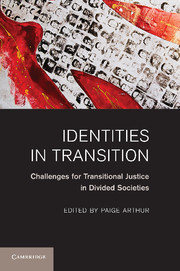Book contents
- Frontmatter
- Contents
- Acknowledgments
- Author Bios
- Introduction: Identities in Transition
- PART I IDENTITY IN TRANSITIONAL JUSTICE MEASURES
- 1 Indigenous Peoples and Claims for Reparation: Tentative Steps in Peru and Guatemala
- 2 Truth Telling, Identities, and Power in South Africa and Guatemala
- 3 Security System Reform and Identity in Divided Societies: Lessons from Northern Ireland
- 4 Staging Violence, Staging Identities: Identity Politics in Domestic Prosecutions
- 5 International and Hybrid Criminal Tribunals: Reconciling or Stigmatizing?
- 6 Silences, Visibility, and Agency: Ethnicity, Class, and Gender in Public Memorialization
- PART II IDENTITIES, TRANSITION, AND TRANSFORMATION
- Index
- References
4 - Staging Violence, Staging Identities: Identity Politics in Domestic Prosecutions
Published online by Cambridge University Press: 01 March 2011
- Frontmatter
- Contents
- Acknowledgments
- Author Bios
- Introduction: Identities in Transition
- PART I IDENTITY IN TRANSITIONAL JUSTICE MEASURES
- 1 Indigenous Peoples and Claims for Reparation: Tentative Steps in Peru and Guatemala
- 2 Truth Telling, Identities, and Power in South Africa and Guatemala
- 3 Security System Reform and Identity in Divided Societies: Lessons from Northern Ireland
- 4 Staging Violence, Staging Identities: Identity Politics in Domestic Prosecutions
- 5 International and Hybrid Criminal Tribunals: Reconciling or Stigmatizing?
- 6 Silences, Visibility, and Agency: Ethnicity, Class, and Gender in Public Memorialization
- PART II IDENTITIES, TRANSITION, AND TRANSFORMATION
- Index
- References
Summary
Trials for major human rights violations have frequently captured public attention and imagination. The 1963–1965 Frankfurt trial for crimes committed in the Auschwitz Extermination Camp was a focal point in the West German political landscape – despite or because of the trial's shortcomings. The 1985 trial of the Argentine juntas in Buenos Aires was broadcast on TV – without sound – and remains a key reference in Argentine political and legal culture. The 1995–1997 Berlin trial of the East German politburo members responsible for the policy of shooting people at the Wall provided a stage for trial participants and commentators to redefine their relationship to the vanished (East) German Democratic Republic (GDR) as part of a larger societal contestation about the relationship between East and West Germany.
Transitional justice mechanisms have been seen as theatrical performances of state power, legality, and norms. They have been analyzed for their use of history, their commitment to legality, and their pedagogical aptitude. Yet the relationships between trials, the spaces of performance they offer, and various forms of identity politics that respond to experiences of violence are less well understood. This essay examines how participants in trials stage and represent identities based on ethnicity, race, region, or political affiliation. Trials reenact periods of violence and state repression in order to submit them to authoritative judgment. There are roles to be played in trials: judges, prosecutors, defendants, defense lawyers, and victim-witnesses, for example. In domestic trials, the main audience is composed of the country's residents.
- Type
- Chapter
- Information
- Identities in TransitionChallenges for Transitional Justice in Divided Societies, pp. 118 - 148Publisher: Cambridge University PressPrint publication year: 2010
References
- 2
- Cited by



